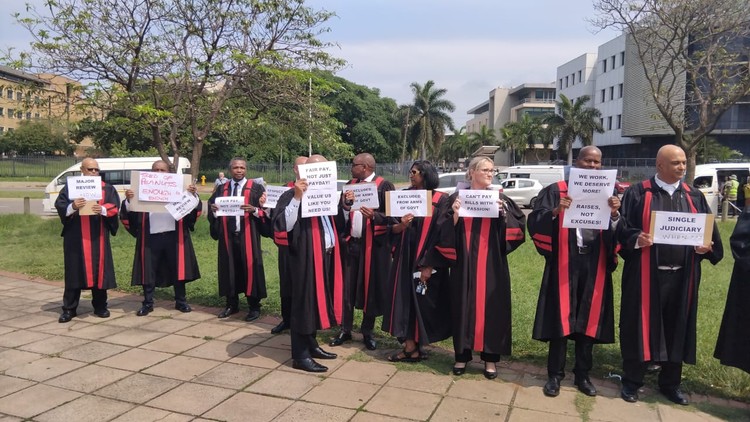Magistrates protest outside court, demanding higher wages
Magistrates are under-recognised and under-paid, says former Constitutional Court judge Edwin Cameron
Over a dozen magistrates picketed outside the court in Durban on Monday. They say the state has ignored their repeated demands for higher wages and better working conditions at the court. Photo: Tsoanelo Sefoloko
Dressed in their red and black robes, about a dozen magistrates downed their gavels to picket outside the court in Durban on Monday, demanding better working conditions and higher pay.
They say they chose to protest during lunch to avoid disrupting court proceedings.
Among their grievances are deteriorating working conditions and delays in implementing salary adjustments. During the picket, the group handed out a petition, demanding a pension fund for magistrates, among other things.
Spokesperson for the group Scelo Zuma told GroundUp their complaints had been repeatedly ignored. “No one seems to be interested in our demands. The working conditions are not impressive at all.”
Currently, the magistrates earn R1.1-million a year but the protesters believe they should be earning at least R1.5-million. Zuma said the workload of magistrates has increased, and they have to do more research and other administrative tasks.
Former Constitutional Court judge Edwin Cameron told GroundUp that magistrates do 95% of the courts’ hard work, in often unappealing conditions, and are “under-recognised and under-remunerated”.
He said the pay differential between judges and magistrates was “unconscionable”. Magistrates should have been termed regional court judges and district court judges, he suggested.
Magistrate Anitha Hariram said she fears for her safety because magistrates are forced to share facilities, such as bathrooms, with the public, and their offices are easily accessible to the public.
A lack of basic office supplies has also contributed to an already challenging working environment, said Hariram. “I had to bring my own router to connect to the internet because we don’t have one in our offices,” she said.
Magistrate Betty Rawheath, who has worked in the judiciary for 40 years, said she hopes their complaints reach the Chief Justice. “We have been having so many talks, but it seems as if our grievances fall on deaf ears.”
The magistrates say they remain committed to continuing to work to uphold the Constitution and the Bill of Rights, but they’re tired of being pushed aside by the Department of Justice and the Office of the Chief Justice.
Questions about the grievances raised by the magistrates were sent to the Magistrate Commission’s secretary, Maritshane Finger, as well as the Department of Justice and Constitutional Development spokesperson, Kgalalelo Masibi. Neither responded by the time of publication.
Support independent journalism
Donate using Payfast

Don't miss out on the latest news
We respect your privacy, and promise we won't spam you.
Next: Buildings torched during University of the Free State protests
Previous: Judge hands down ruling three years late
© 2025 GroundUp. This article is licensed under a Creative Commons Attribution-NoDerivatives 4.0 International License.
You may republish this article, so long as you credit the authors and GroundUp, and do not change the text. Please include a link back to the original article.
We put an invisible pixel in the article so that we can count traffic to republishers. All analytics tools are solely on our servers. We do not give our logs to any third party. Logs are deleted after two weeks. We do not use any IP address identifying information except to count regional traffic. We are solely interested in counting hits, not tracking users. If you republish, please do not delete the invisible pixel.

